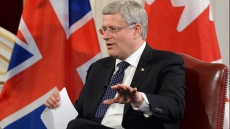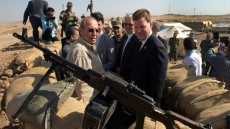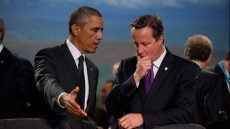OTTAWA - The Bank of Canada is reinforcing its hands-off position when it comes to influencing the Canadian dollar.
Targeting the exchange rate would see the bank lose its ability to pursue an independent monetary policy and cause more harm than good to the economy, Bank of Canada governor Stephen Poloz said.
"A floating loon is a thing of beauty, and so is a floating loonie, at least from this economist's perspective," Poloz said Tuesday in prepared remarks of a speech he was to deliver in Drummondville, Que.
The economic conundrum facing policy-makers is how to spur economic growth in the face of rising dollar values hurting exporters, whose sales are essential to revving Canada's economic engine.
Calls for the bank to step into the currency market as a solution won't be answered, said Poloz, who headed Export Development Canada before taking over at the central bank.
The Bank of Canada's job is to not to interfere in the market, but understand the context it is providing as the bank chooses how to set interest rates to meet its inflation targets, he said.
"Trying to hold the dollar constant would give us larger fluctuations in unemployment, output and inflation and in the end would not help us maintain our international competitiveness," Poloz said.
In a what-if scenario, Poloz examined what could have happened had the bank stepped into the currency market in the years of soaring growth for the loonie in the mid-2000s.
He says had the bank attempted to stop the dollar from rising alongside oil prices in 2005, massive cuts to interest rates would have been required which in turn would have seen inflation rise and the economy overheat. That would have left the bank no room to deal with the subsequent financial crisis in 2008.
Nor would the bank ever offer even verbal guidance on what the value of the dollar ought to be, Poloz said.
The markets are better at that, he said.
"Our exchange rate depends on a host of domestic and foreign fundamentals, many of which are beyond the bank's influence," Poloz said.
"Better that these myriad effects be weighed, debated and wrestled within a deep marketplace than in a simple statistical model developed by the central bank."
Some economists have suggested that Poloz's "dovish" talk on interest rates has helped take some of the shine off the loonie.
The Canadian dollar was worth about 97 cents US when Poloz took over the top job at the central bank last year. The loonie is now worth about 91 cents US.
Poloz said exports are slowly starting to rebound, but the bank remains wary of the "serial disappointment" the global economy has delivered in recent years.
"We are cautiously optimistic about our exporting future," he said.
"It will take more than a few months to establish a trend, and then still longer for it to translate into more investment and hiring by companies, but it looks like the natural sequence we've been hoping for is getting underway."
Still, the central bank indicated earlier this month that it does not foresee enough of a change in Canada's economic fortunes to adjust its key interest rate from the one per cent level it has held for the last four years.
The Bank of Canada's next rate announcement is set for Oct. 22 when it is also expected to publish an update to its monetary policy report.
The Canadian dollar had risen slightly Tuesday morning ahead of Poloz's speech, as the latest data showed that Canadian manufacturing sales in July handily beat analysts' expectations.
Statistics Canada said sales rose 2.5 per cent to $53.7 billion in July, exceeding the previous record of $53.2 billion set in July 2008.





